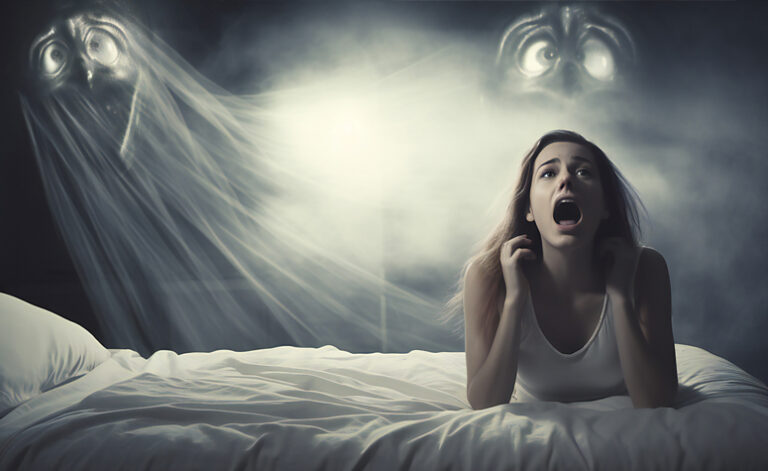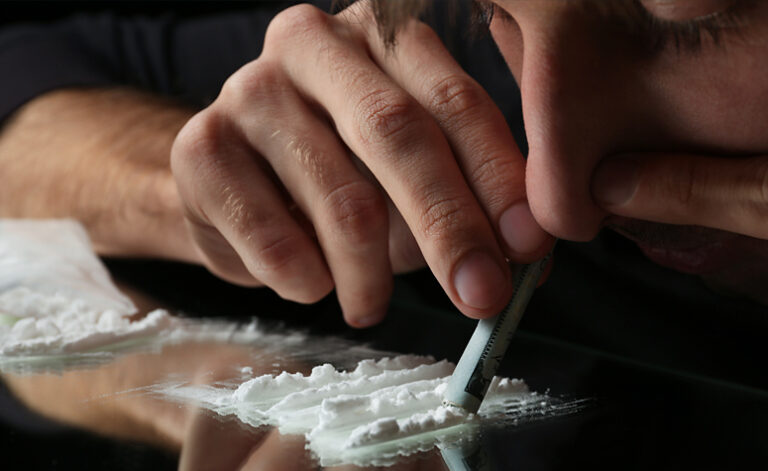Drug-Induced Psychosis;
Causes, Symptoms and Treatment
Psychosis is a mental health problem which temporarily alters an individual’s perception of the world compared to those around them. Drug-induced psychosis occurs when episodes of psychosis, such as delusions or hallucinations, are experienced due to substance abuse. This can worsen or lead to the development of mental illnesses such as bipolar disorder and schizophrenia, which can be characterised by symptoms of psychosis, often due to a predisposition to the condition.
Drug-induced psychosis often results when an individual consumes an excessive amount of a specific drug, its increased level of toxicity triggering paranoia and a psychotic episode. In addition, it can also result from having an adverse reaction to a mixture of different substances or during withdrawal from a prescribed or non-prescribed drug.
Psychosis is typically characterised by delusions or hallucinations – experiences that significantly deviate from reality. Delusions are irrational beliefs individuals persist in despite being presented with evidence to the contrary. Hallucinations are intense sensory perceptions of unreal phenomena characterised by individuals vividly feeling, seeing, smelling, or hearing things that do not realistically exist.

Common Symptoms of Drug-Induced Psychosis
The symptoms of drug-induced psychosis often manifest gradually, with the drug’s toxicity becoming progressively dangerous with the increased frequency and dosage due to dependency. If you have an underlying mental condition, the use of psychoactive drugs is likely to exacerbate your symptoms, resulting in extreme paranoia. Additionally, it can accelerate the onset of psychotic disorders such as bipolar disorder and schizophrenia. Excessive use of drugs and alcohol can also induce symptoms of psychosis even if you haven’t been diagnosed with co-occurring mental illness.
Some of the symptoms of drug-induced psychosis include:
- Paranoia
- Delusions
- Auditory and visual hallucinations
- Olfactory (smell) hallucinations
- Anti-social behaviour
- Panic attacks
- Confusion
Symptoms of delusion
Delusion occurs when you believe something that doesn’t align with the natural world is happening and dismiss anything that challenges this belief because the perceived scenario feels very real to you.
Delusions have many forms, including:
- Persecution delusions
The convincing feeling that someone is spying on you. - Jealousy delusions
When you believe your partner has been unfaithful despite the absence of any specific evidence for this. - Grandiose delusions
Where you may experience an inflated sense of power, such as believing that you have magical abilities or that you have made a significant discovery.

Hallucination symptoms
Hallucinations are altered and distorted sensory perceptions of what is happening around you. They can often involve visual or auditory changes but can also include changes in smell and touch.
Hallucinations take on various forms, including:
- Auditory hallucinations
This when you are hearing voices, such as a voice describing your movements or actions or two separate voices arguing with each other. - Visual hallucinations
When you start seeing a reality that is different from that of others, which may include for example, seeing shadows, objects, and people that aren’t really there, and can be particularly distressing. - Olfactory hallucinations
When you believe that you are emitting strange odours or something is decaying inside, with the fear made worse by the thought that others can also smell it.

What Drugs can Send You into Psychosis?
Drugs commonly reported in drug-induced psychosis and often trigger psychotic symptoms include cannabis, cocaine, amphetamines, methamphetamine, psychedelic drugs such as LSD, and club drugs such as ecstasy and MDMA. Symptoms of psychosis can vary depending on the type of drug and the quantity taken, but persistent symptoms can result from heavy and excessive use.
Drugs such as cocaine, cannabis and hallucinogens can also exacerbate symptoms in individuals with existing mental illnesses. Persistent use of substances like cannabis can also lead to symptoms of psychosis, including paranoia, because high doses of tetrahydrocannabinol (THC), the active ingredient of cannabis, can induce temporary psychotic symptoms resembling schizophrenia, such as paranoia, delusions, anxiety, hallucinations, and other signs of cannabis addiction.
Drug-induced psychosis using prescription medication often results from not taking the recommended dosage or continuing to use the drug beyond the prescribed duration. When abused, drugs such as ketamine can induce psychosis-like symptoms like disordered thinking and delusions.

Drug-Induced Psychosis Recovery
If you are diagnosed with drug-induced psychosis, it will usually be associated with co-morbidity or a diagnosis involving both substance addiction and an underlying mental illness. These two issues need to be treated separately for effective recovery and reduction of symptoms. This entails undergoing a medically supported detoxification programme to achieve medical stability and manage withdrawal symptoms before receiving treatment for any underlying mental health issues which may have contributed to the onset of psychosis symptoms.
While the elimination of the drug from your system may alleviate the symptoms of psychosis due to an underlying mental health condition such as anxiety or depression that led to excessive drug use or a diagnosed psychotic disorder such as bipolar disorder or schizophrenia, further treatment is necessary to address these conditions and facilitate recovery.
If psychosis was due to medications prescribed for an underlying mental illness, a diagnosis will involve assessing whether the symptoms would persist without the drug present. If they do, the psychosis is not drug-related. Conversely, in a drug-induced psychosis, your symptoms will subside upon discontinuation of the drug. The initial symptoms, such as social withdrawal and lack of motivation, may progressively increase to include delusions and hallucinations.
If the underlying mental health condition includes psychotic episodes as one of its symptoms, antidepressants, anti-psychotics or other medications such as clozapine (Clozaril) may be prescribed for an extended period. These medications are especially beneficial if delusions and hallucinations occur frequently and are particularly severe.

What lies behind us and what lies before us are
tiny matters compared to what lies within us
Drug-Induced Psychosis Treatment
The first step in the treatment of drug-induced psychosis is to discontinue the use of the drug that caused the episode. At AddictionRehab we offer a medically assisted detoxification programme that ensures you will have no further interaction with potentially habit-forming medications by replacing them with carefully selected drugs that specifically address only withdrawal symptoms.
Once your condition has been medically stabilised, you may begin your therapy process. Cognitive behavioural therapy (CBT) is a practical and problem-solving therapy that can help you identify and better understand your thoughts and moods before psychotic episodes, enabling you to manage your emotions and paranoia and recognise triggers.
Given the severity of drug-induced psychosis and associated psychotic conditions, both individual and family therapy may be necessary as it is crucial to have support at home to prevent relapse, manage related symptoms, and reduce the possibility of needing extensive hospital treatment.
AddictionRehab’s therapists and consultants are highly trained and experienced in managing drug-induced psychosis. We provide treatments within a safe and understanding environment and a personalised treatment plan that addresses associated symptoms of psychosis and drug addiction initially before focusing on any underlying health issues resulting from substance abuse.

FREE Addiction Assessment
If you or a loved one are struggling with addiction, our professionals are ready to offer compassionate help and support. Our addiction specialists will help you uncover the deep-seated reasons and conditions that may be fuelling your drug addiction.
This crucial step will enable us to guide you towards adopting more effective coping strategies, initiating your path to a brighter, healthier future.
Our highly trained advisers are available to speak to you right away, simply call 0808 252 3379 today.
We can discuss your concerns in complete confidence, explore the options for treatment, and help you to understand what will work best for you.
We’ll also help you to book your free addiction assessment there and then, with appointments usually available within only a few days.
We understand that taking the first step can be the most difficult, but we’re here to support – with no pressure or judgement.
Professional and compassionate help is just a phone call or click away.




